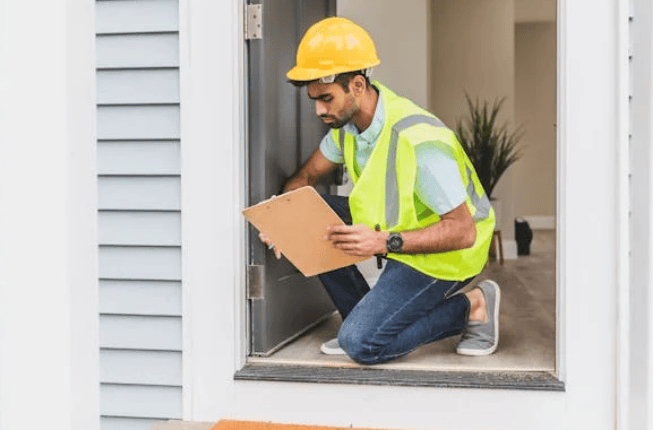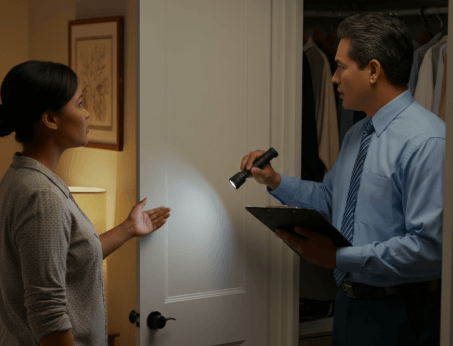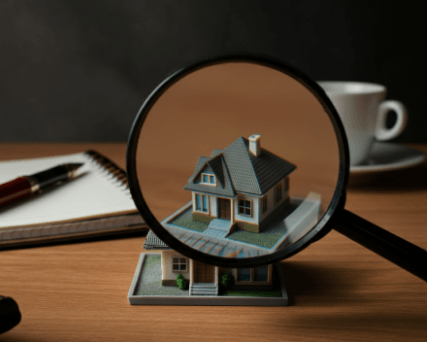Selling or buying a home can be both thrilling and nerve-wracking. One aspect that often causes anxiety is the home inspection. Many sellers and buyers wonder, do home inspectors look in closets? In this blog post, we’ll explore that question and provide a comprehensive guide to help you understand what to expect during a home inspection. By the end of this article, we’ll answer the question, do home inspectors look in closets? And you’ll be well-prepared for your next real estate transaction.
When preparing for a home inspection, it’s important to understand what areas will be thoroughly evaluated, including closets. Real estate investors like Steve Daria and Joleigh emphasize ensuring that closets are well-organized and clutter-free, as inspectors will check for any signs of moisture or damage. Taking these steps not only aids in the inspection process but also enhances the home’s overall appeal.
Understanding Home Inspections
Home inspections are a crucial part of the real estate process, providing a comprehensive evaluation of a property’s condition.
These inspections ensure there are no hidden issues that could affect the property’s value or the safety of its inhabitants.
The inspector’s role is to assess different elements of the home, including the structural integrity, electrical structure, plumbing, roofing, and more.

By identifying any necessary repairs or maintenance, the inspection assists buyers in making well-informed decisions and negotiating better terms.
The Importance of Home Inspections
These are important for both buyers and sellers, standing as a key role in the real estate process.
For buyers, an inspection provides peace of mind by confirming that the property they are investing in is free from major defects and hidden issues.
This comprehensive assessment helps buyers avoid costly repairs and ensures that the home meets safety and quality standards.
On the other hand, sellers can use a pre-listing inspection to identify and address any problems before putting their home on the market.
What Home Inspectors Look For
Home inspectors examine various aspects of a property, including the foundation, roof, plumbing, electrical systems, and more.
Essentially, they aim to ensure everything is functioning correctly and safely.
But do home inspectors look in closets?
Get An Offer Today, Sell In A Matter Of Days…
Do Home Inspectors Look in Closets?
Yes, home inspectors do look in closets.
While it may seem intrusive, checking closets is standard practice. Here’s why:
Why Inspect Closets?
Inspectors check closets to ensure there are no concealed issues, such as structural problems, mold, or pests.
Closets can also house important components like electrical panels or access points to the attic or crawl spaces.
What Inspectors Look For in Closets
When inspecting closets, home inspectors typically look for:
- Signs of Water Damage: Stains, mold, or mildew could indicate leaks or plumbing issues.
- Structural Issues: Cracks or shifts in walls that might suggest foundation problems.
- Electrical Components: Panels or wiring that need to be in good condition.
Preparing Your Closets for Inspection
If you’re selling a property, it’s essential to prepare your closets for inspection.
Here are some tips:
- Declutter: Remove unnecessary items to give the inspector clear access.
- Clean Thoroughly: Ensure closets are clean and free from dust and debris.
- Provide Access: Make sure any electrical panels or access points are easily reachable.
Other Common Areas Inspected
Beyond closets, home inspectors look at various parts of the property to ensure everything is in order.
Let’s explore some of these areas.
- The Attic: Inspectors often check the attic for proper insulation, ventilation, and signs of pests or water damage.
- The Basement: Basements are inspected for signs of moisture, foundation cracks, and the condition of the HVAC system.
- The Roof: Inspectors assess the roof’s condition, looking for missing shingles, leaks, or other damage that could lead to costly repairs.
Key Exterior Elements
Home inspectors also examine the exterior of the property to identify any possible issues that could affect its value or safety.
- Siding and Paint: Inspectors will look for peeling paint, cracks, or signs of rot.
- Windows and Doors: Inspectors check windows and doors for proper sealing, operation, and signs of damage.
- Landscaping and Drainage: Inspectors will assess the grading around the property and ensure water flows away from the foundation.
Interior Systems
Inside the home, inspectors focus on various systems to warrant they are functioning correctly and safely.
- Plumbing: Inspectors check the plumbing for leaks, proper water pressure, and the condition of fixtures. They also inspect water heaters and sump pumps.
- Electrical: The electrical system is thoroughly examined for safety hazards, proper grounding, and the condition of outlets and switches.
- HVAC: Heating, ventilation, and air conditioning setup are vital for comfort and safety. Inspectors check these systems for proper operation, maintenance, and potential issues.
Preparing for a Home Inspection
Whether you’re buying or selling, preparing for a home inspection is essential.
Here are some tips to help you get ready.
For Sellers
- Make Repairs: Address any known issues before the inspection to avoid surprises.
- Provide Access: Ensure the inspector can access all areas of the property, including closets, attics, and basements.
- Be Honest: Disclose any known issues to the inspector upfront.

For Buyers
- Attend the Inspection: Being present during the inspection permits you to ask questions and gain a better understanding of the property.
- Review the Report: Carefully study the inspection report and talk about any issues with your real estate partner.
- Negotiate Repairs: If significant issues are found, arrange with the seller for fixes or a price reduction.
Frequently Asked Questions
Do home inspectors look in closets? Explore the most common queries:
How Long Does a Home Inspection Take?
A usual home inspection takes 2-4 hours, based on the size of the property and condition.
Can I Be Present During the Inspection?
Yes, it’s highly recommended that buyers attend the inspection to ask queries and get a firsthand look at any issues.
Being present allows you to interact directly with the inspector, gaining valuable insights and understanding the property’s condition in detail.
What If the Inspector Finds Major Issues?
If the inspector finds major issues, buyers have several options to consider.
They can negotiate with the seller for necessary fixes to be completed before closing or request a price reduction to cover the cost of fixing the problems themselves.
In some cases, if the issues are too notable or costly, buyers may choose to walk away from the deal entirely, protecting themselves from potential financial and structural burdens.
Conclusion
Home inspections are a critical part of the real estate process, providing valuable insights for both buyers and sellers. Yes, home inspectors do look in closets, but for good reason—they’re ensuring the property’s safety and integrity. By understanding what to anticipate and preparing accordingly, you can make the inspection process smoother and more efficient.
**NOTICE: Please note that the content presented in this post is intended solely for informational and educational purposes. It should not be construed as legal or financial advice or relied upon as a replacement for consultation with a qualified attorney or CPA. For specific guidance on legal or financial matters, readers are encouraged to seek professional assistance from an attorney, CPA, or other appropriate professional regarding the subject matter.

